COP26: Climate action urgently needed during Decade on Ecosystem Restoration
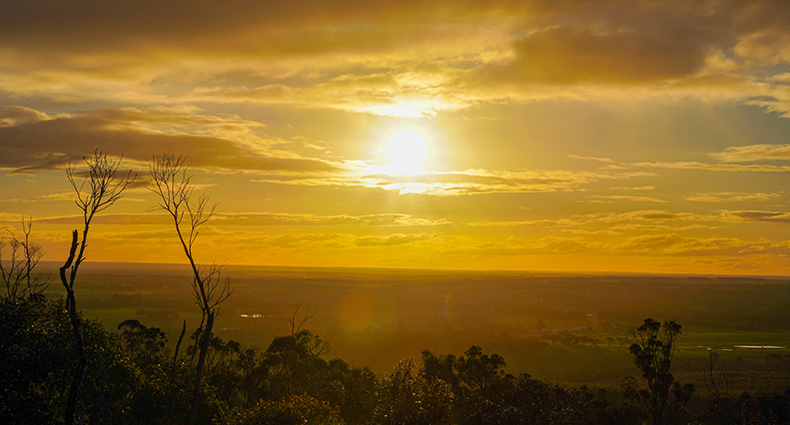
Photo credit Jesse Collins
The 2021 United Nations Climate Change Conference (COP26) is due to wrap up today.
With the effects of climate change already clearly apparent in Australia, will the conference deliver on hopes for accelerated action on the world’s twin crises of climate change and biodiversity loss?
We can see momentum building for change; however, the conference’s goal of getting wholesale global commitments limiting warming to 1.5°C still seems out of reach, and it remains to be seen how the pledges made will be achieved.
Australia’s momentum has gone backwards, ranking last for climate policy according to the annual climate change performance index released at COP26. Australia also slipped four places lower from its overall 2020 ranking, with no changes in reduction targets for 2030. Our best score is for renewables, where state and territory governments and the private sector have played vital leadership roles.
There’s still time to convert the urgency and reality of the situation into meaningful impact for the future, but we need to act now, in the ten years to 2030.
Here are some key points from COP26.
Reducing and mitigating greenhouse gas emissions
- There’s been a surge in the number of countries adopting net zero targets for emissions reductions, which if implemented, could put the Paris Agreement goals within reach. In the lead-up to COP26, Australia confirmed a target of net-zero carbon by 2050, but no increase in its target for 2030. To strengthen Australia’s climate policy and achieve the estimated 45% reduction required by 2030 to ‘keep 1.5°C alive’, more ambitious short- and medium-term goals are needed.
- This current decade is critical for climate action and reversing biodiversity loss, as recognised by the UN, who declared 2021-2030 as the Decade on Ecosystem Restoration. Greening Australia has set its own ambitious restoration goals for 2030 to contribute towards global renewal.
- Nature-based solutions could contribute over one third of the total climate mitigation needed over the next decade – but financing needs to increase more than fivefold by 2030 to realise this potential. Environmental markets, such as the carbon market, will be critical for leveraging private sector funding for ecosystem restoration. Governments need to embrace their role as mobilisers of collaborative effort to remove barriers and accelerate impact. Greening Australia welcomed progress on the Australia-initiated Indo-Pacific Carbon Offsets Scheme during COP26, which saw partnerships announced with Fiji and Papua New Guinea to create a more efficient and accessible carbon market in the region.
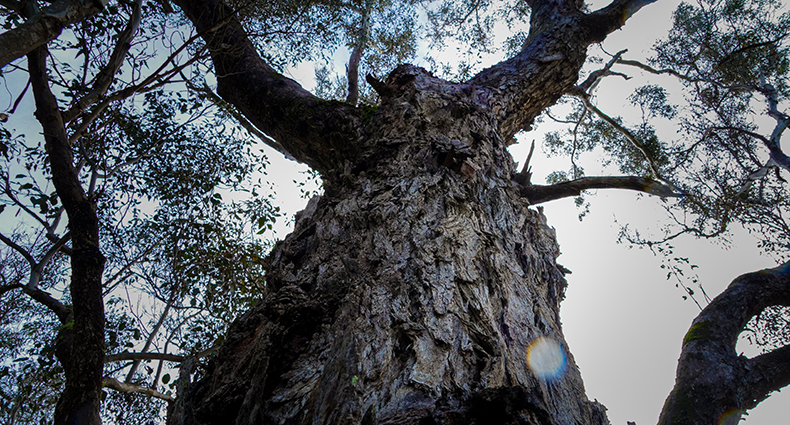
Photo credit Jesse Collins
Protecting and restoring carbon-capturing forests
- Deforestation is a key global contributor to carbon emissions, as trees are vital for absorbing and storing atmospheric carbon. More than 100 world leaders at COP26 signed a declaration on forests and land use, agreeing to strengthen efforts to conserve forests and other terrestrial ecosystems and accelerate their restoration by 2030 – including Australia. Australia is among the worst of the world’s developed countries when it comes to broadscale deforestation, so this is a welcome step. While the previous global agreement in 2014 failed to reduce deforestation, this time billions of dollars are backing the pledge – significantly, from both public and private sectors.
- Removing atmospheric carbon through large-scale diverse tree planting provides an immediate opportunity to reduce and adapt to the impacts of climate change, while providing long-term benefits to nature, communities and the economy.
- Integrating carbon plantings into agricultural systems can also provide an important additional revenue stream to landholders and increase farm productivity, which in turn can lead to better management of risks from fire and invasive species that could reduce the carbon value or revenue stream.
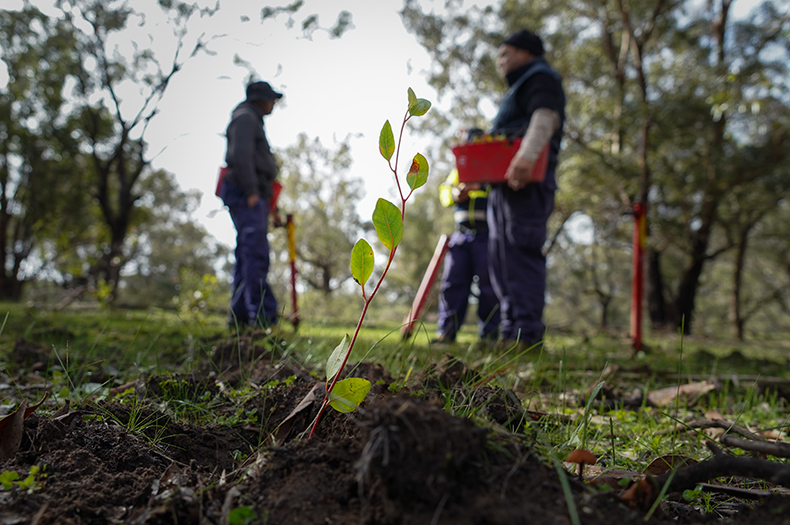
Photo credit Jesse Collins
Ensuring carbon plantings promote biodiversity
- Botanic Gardens Conservation International (BGCI) announced the Global Biodiversity Standard during COP26. This is the world’s first and only standard that specifically recognises and promotes the protection, restoration, and enhancement of biodiversity.
- The Standard is a sound first step in combatting ‘plant a tree at any price’ carbon solutions that employ mass plantings of non-native species. Such approaches to capturing carbon can lead to degradation or loss of native ecosystems and introduce new pests, diseases and invasive species that threaten global biodiversity.
- Greening Australia welcomes the Standard to incentivise high quality restoration projects, that actively protect and enhance biodiversity and provide benefits to local communities, while also capturing carbon. Through the diversity of native species we use, the habitat connections we create in the landscape, and the threatened species supported by our projects, every Greening Australia project contributes to halting and reversing biodiversity loss.
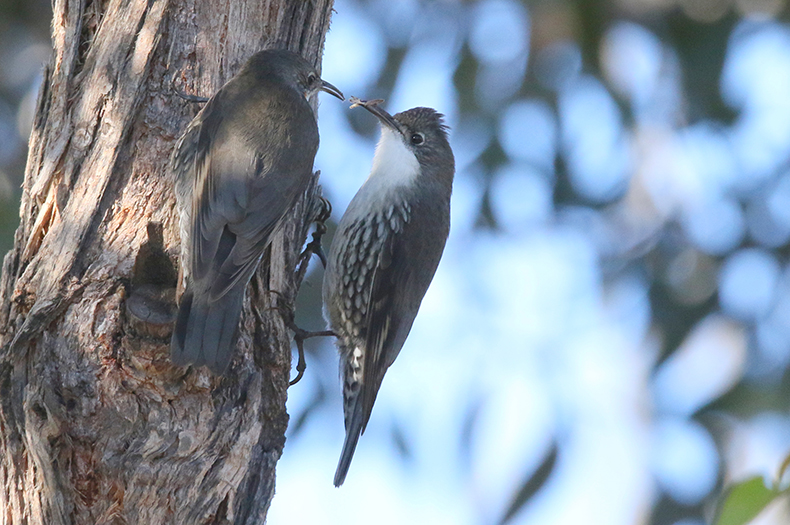
Photo credit Kevin Williams, Birdlife Hamilton
A make-or-break decade
While COP26 is not the only arena for committing to climate action, it is seen as a litmus test for global attitudes. That makes some COP26 outcomes especially disappointing, particularly where major emitters (including Australia) skipped pledges on reducing methane emissions and transitioning away from coal.
On the positive side, many countries did sign these pledges. Also, the world’s two largest emitters – the United States and China – made a potentially significant joint declaration for stronger cooperation on climate action to reduce greenhouse gas emissions over the next decade.
Governments have a pivotal role in signalling intention and driving global consensus – and creating conditions where all sectors can work together on sustainably transitioning the economy and tackling climate change. Increasingly, Australian businesses are making their own commitments to sustainability, and calling for stronger action and clear direction from all levels of government to improve immediate action and longer term decision making. Collaboration will be key for meaningful impact during this decade.
Genuine climate action is critical as people and nature in Australia – and worldwide – face increasing environmental pressures. The Intergovernmental Panel on Climate Change estimates the world will pass 1.5°C warming in 2040 if emissions are not checked. Keeping warming to 1.5°C is required to help avoid the worst climate impacts.
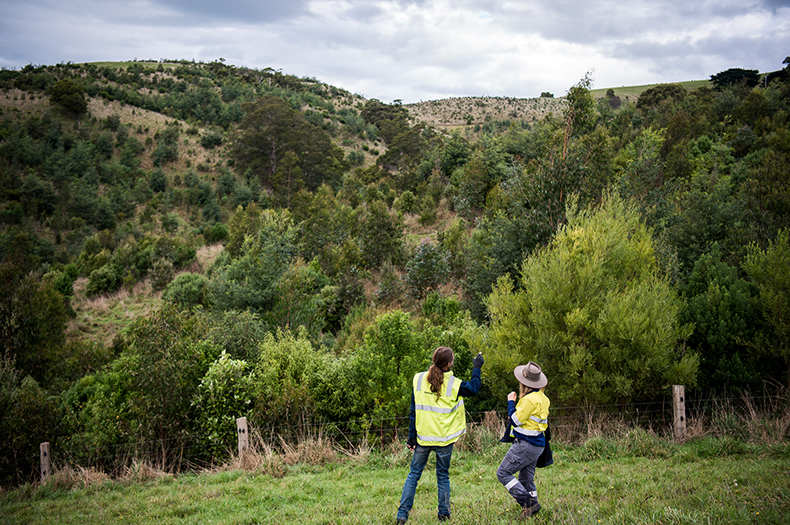
Photo credit Annette Ruzicka
Helping people and nature now
There are practical actions we can already take as a nation and as a global community to reduce and capture emissions. For example, the millions of trees and shrubs Greening Australia plants each year are directly mitigating climate change by capturing atmospheric carbon as they grow – not to mention improving the carbon-holding capacity of soil.
We can also boost our environmental and social resilience by taking action to help people and nature adapt to the changes we are already seeing. For example, Greening Australia is using climate modelling, spatial prioritisation and other science-led approaches to better understand how our restoration projects can help plant and animal species in the race to adapt.
And we are researching and developing new climate-ready planting approaches to reduce the risk of our restoration efforts being undone by changes in temperature, rainfall and fire frequency.
The past two years have shown that if the world is united in urgency and purpose, we can respond rapidly to global problems.
If we want to see a healthy planet where people and nature thrive, then we need 2021-2030 to be a transformational decade of change, in which we both curb emissions and capture historic emissions at an unprecedented scale.
Rather than be overwhelmed by the enormity of the challenges, let’s get excited about what is possible in the years ahead if we all roll up our sleeves together, right now.
Here’s more on high-level outcomes from COP26. A draft COP26 text has been released, which should form the basis of an agreement that all countries attending will sign. Keep an eye out for news on this final agreement as it will set the global agenda on climate change for the next decade.
Whatever happens, nature needs our help. Please consider donating to Greening Australia and our work restoring landscapes.